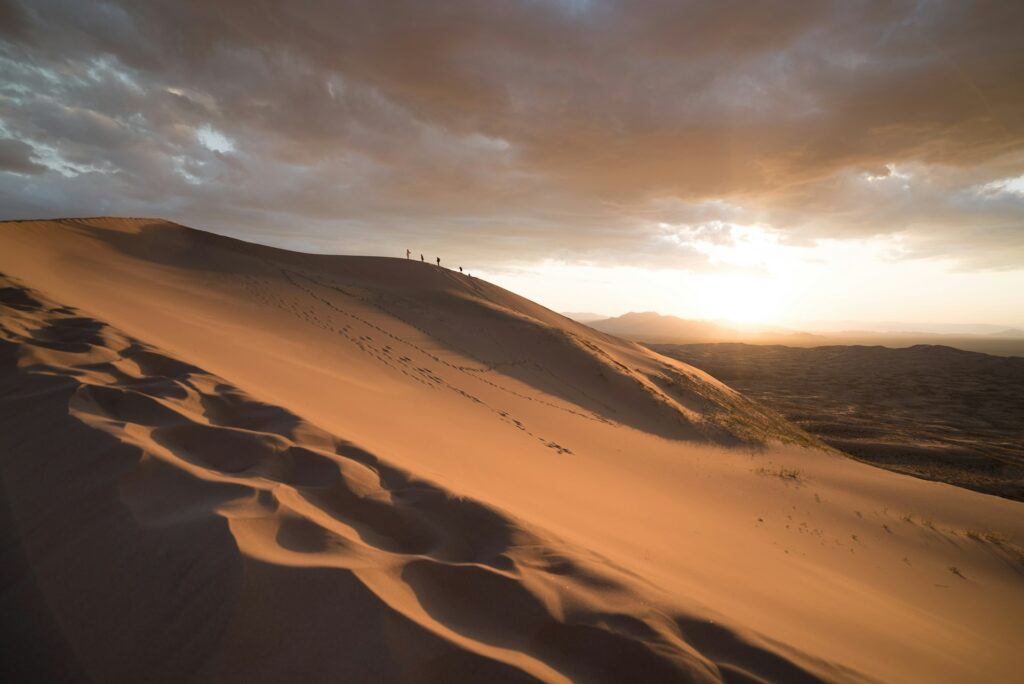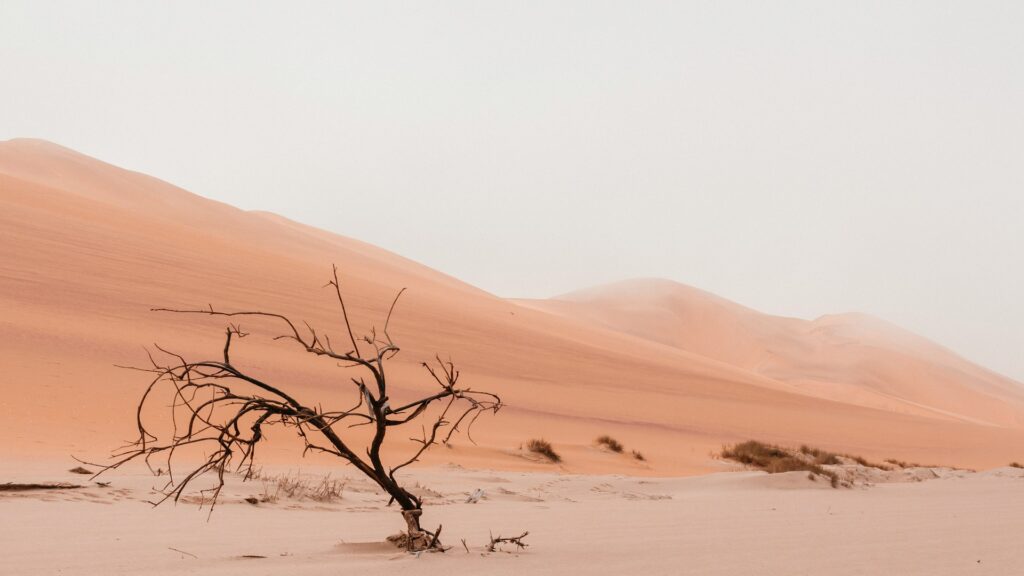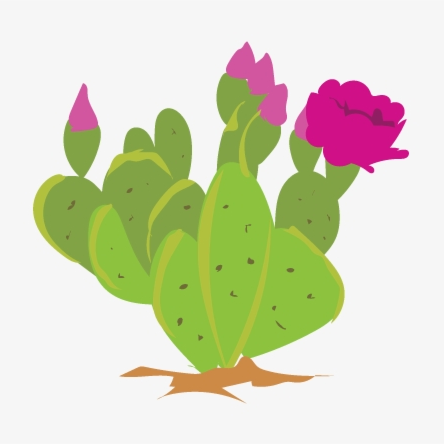19 Dec Wilderness Wandering: Our Cactus in the Desert
I thought of the wilderness as the place of weakness. But then I realized I had it backward. The wilderness isn’t the place of weakness; it’s the place of strength. “Jesus was led by the Spirit into the wilderness” because it was there, and only there, that Jesus was at the height of his spiritual powers. It was only after a month and a half of prayer and fasting in the quiet place that he had the capacity to take on the devil himself and walk away unscathed.
–John Mark Comer, “Ruthless Elimination of Hurry”
It should come as no surprise that “hugging your cactus” usually starts in the desert wilderness. That’s where cacti live. That’s where Jesus and most great spiritual teachers went to get away.
Too often, we view both literal and spiritual wandering as waste of time. We fixate on how they feel, how uncomfortable we are. We miss how they are an opportunity to grow and be strengthened.
“I’m hot. I’m thirsty. I’m bored.”
That last one is the most painful. We are addicted to constant stimulation and our short attention spans bear witness. In this digital age, I wonder if needing retreats from all of our screens and technology is the reason for silence and solitude—fancy spiritual sounding words for simply “getting away.” In fact, my favorite part about going to Rocky Mountain National Park is that I don’t get cell signal there. I imagine heavenly angels standing guard at the park gate with specially designed shields for blocking cellular waves.
So, Jesus is inviting us to get away.
Are you tired? Worn out? Burned out on religion? Come to me.
Get away with me and you’ll recover your life. I’ll show you how to take a real rest.
—Matthew 11:28 (The Message)
Away from the noise. Away from the #hustle. Away from busyness. Away from all the other voices that constantly bombard our lives.
To hear a new voice.
The voice of our Good Shepherd.
The only voice that can tend to our souls.
The voice that leads us to still waters, green pastures.
But here’s the thing. We have to be really careful here, lest we turn a gift into a burden. Our journey into the wilderness will only be received well if it’s led by the Spirit. Jesus was led by the Spirit into the wilderness to do battle with not only the devil, but his own selfishness and ego. The temptations Jesus faced were primal and basic.
Turn stones into bread. Meet your basic needs and basest appetites.
Jump off the temple. Show off. Give into pride.
Worship me to gain the nations. Avoid pain, avoid the cross.
Jesus’ model of a painful journeying into the desert is part of why we are so drawn to the image of hugging your cactus. We learn to face and doing battle with both our inner and outer demons, instead of numbing their noise and nuisance. We learn that “getting away” is not about a break, but an opportunity to step onto the only battleground that matters: the one for our soul.
Solitude is not a private therapeutic place. Solitude is the furnace of transformation. Without solitude we remain victims of our society and continue to be entangled in the illusions of the false self.
–Henri Nouwen, “The Way of the Heart”

Wilderness wandering happens regularly in scripture. Moses spent decades in the wilderness alone as a shepherd before he led the nation of Israel in their communal wandering. Paul spent years in Arabia before he went on any of his missionary journeys. David spent time in the wilderness while he was on the run from Saul (and wrote a bunch of psalms about the experience). So, sometimes we choose the wilderness, sometimes the wilderness chooses us.
I believe it was both Paul’s literal time in the wilderness as well as how he embraced wilderness seasons that led him to say these beautiful lines.
So, to keep me from becoming proud, I was given a thorn in my flesh, a messenger from Satan to torment me and keep me from becoming proud. Three different times I begged the Lord to take it away. Each time he said, “My grace is all you need. My power works best in weakness.” So now I am glad to boast about my weaknesses, so that the power of Christ can work through me.
–2 Corinthians 12:7b-9

We can only embrace our weaknesses in our everyday lives when we learn to embrace our weakness in the wilderness. For, the beauty of the wilderness is that we are stripped of our usual tactics and tricks. Our devices don’t work. Our usually reliable coping mechanisms fail us. We learn the beauty and necessity of dependence, dependence on God. It is here we learn the truth that only with open hands can we receive the gifts of God; only a heart that’s been humbled and crushed can be molded into something beautiful; only when we realize how little power and strength we have compared to God can we unleash his awesome potential in our lives.
So, here’s our challenge. Are you ready to accept wilderness seasons as a blessing? Are you brave enough to even intentionally step into literal or spiritual wilderness places in order to let God work on the ugly parts of your soul? For, it’s usually in the quiet and desolate places that God refines and shapes us most. Here’s a poem I wrote to summarize this idea.
PAUL
A sharp thorn humbly worn, despising the scorn,
Strength from weakness is born, labor pains forlorn,
Emptied to be fully filled, and stirred to be stilled,
Destroyed only to now build, new life to the killed.
MOSES
Midian place of yearning, a bush was burning,
Holy ground found at the sound, the voice of renowned,
The riddle spoken, profound, mystery confounds,
“I AM,” his name did resound, His presence abounds.
DAVID
Sheltered in Adullam cave, refuge for the brave,
In a cave David forgave, Saul, less king than knave,
A site of testing, tearing—the robe Saul’s wearing—
Instead mortal flesh, sparing, Kingship preparing.
JESUS
Led by the Holy Spirit, into fasting and prayer,
Forty days and forty nights, laid bare to prepare,
For testing his true hunger, for bread or for words,
Truly, what grants us real life, true manna and birds.
With prophetic memory, Satan was undone,
With heavenly reliance, victory was won.
US
In the wild we still wander, only to wonder,
In busyness souls flounder, hearts torn asunder,
By wilderness we are tamed, from silence new named,
In solitude we’re reclaimed, in prayer life’s reframed.

No Comments